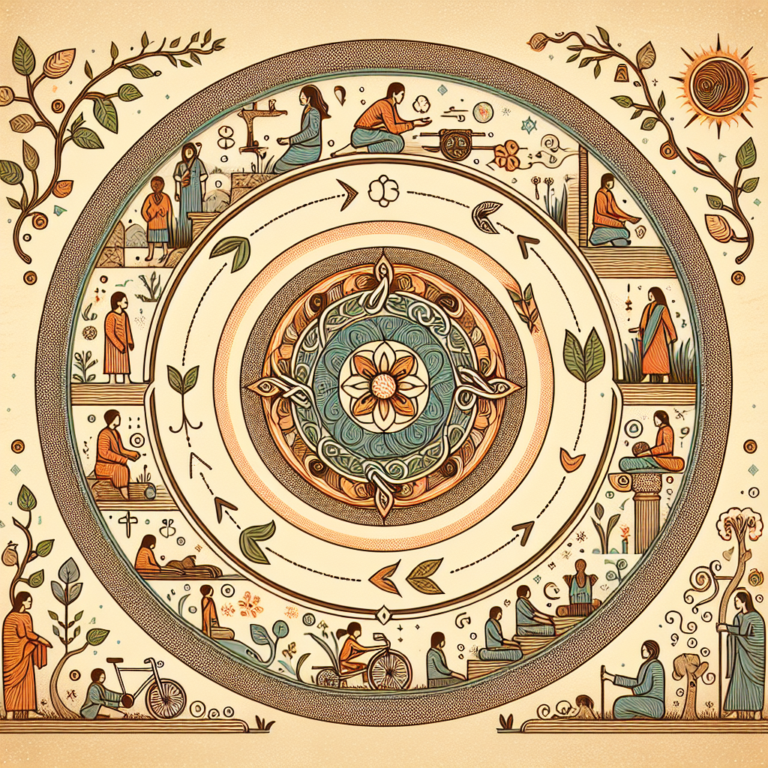The Cycle of Consequences: Understanding Negative Karma and Its Impact on Our Lives
Karma is a term that has transcended its spiritual origins and entered mainstream dialogue. While often used to describe the notions of ‘what goes around comes around’ or ‘you reap what you sow’, the concept of karma encompasses much deeper dimensions of moral, ethical, and philosophical considerations. Specifically, the focus of this article is on negative karma—the repercussions of harmful actions that reverberate through our lives and the lives of those around us.
Understanding Karma
The ancient concept of karma finds its roots in Indian religions, particularly Hinduism and Buddhism. It refers to the law of moral causation, where every action has consequences that can manifest immediately or over a long period. Karma can be categorized into three types: positive, negative, and neutral. Negative karma arises particularly from harmful actions or intentions that violate ethical and moral principles.
The Cycle of Consequences
The cycle of consequences initiated by negative karma can be dissected into several stages:
Action (Karma): Every action, thought, or intention generates a particular energy. When one engages in negative actions—be it through deceit, violence, or malicious intent—that energy is set into motion.
Reaction (Vipaka): The consequences of actions lead to certain reactions, known as ‘vipaka.’ These may include personal suffering, harm to others, and even collective societal implications. The reaction phase can sometimes seem deferred, allowing individuals to believe they have escaped consequences; however, the repercussions will eventually emerge.
Enlightenment (Jnana): Wisdom often arises from the experience of suffering. The realization stemming from negative karma can lead individuals to gain insights about their actions, prompting a desire for change, growth, and understanding.
- Resolution (Moksha): This final stage involves liberation from the cycle of negative karma. Through acknowledgment of past actions and a commitment to amend future behavior, individuals can transcend previous cycles of feedback and achieve a form of enlightenment.
Impacts of Negative Karma
Understanding negative karma and its consequences can be transformative. The implications extend not only to the individual but to the broader community and the environment. Here are a few ways in which negative karma can influence life:
1. Personal Relationships
Negative karma often manifests in strained relationships and broken bonds. When an individual acts hurtfully towards friends, family, or colleagues, the ensuing consequences are rarely confined to the perpetrator. Instead, they ripple outward, leading to estrangements, betrayals, and emotional wounds. An individual might find themselves isolated or burdened by ongoing conflict due to unresolved negative karma.
2. Mental and Emotional Health
Karma also plays a significant role in mental and emotional well-being. Perpetrators of negative actions may carry guilt, shame, or regret, which contribute to anxiety, depression, and feelings of unworthiness. This emotional baggage can hinder personal growth and result in an ongoing cycle of self-sabotage, often making it more challenging to forge positive relationships and experiences.
3. Societal Dynamics
On a macro scale, negative karma can lead to societal dysfunction. When leaders and institutions engage in unethical behaviors—such as corruption, discrimination, or exploitation—the resulting societal decay can take years, if not decades, to rectify. The cumulative effects of negative actions can undermine trust within communities, incite social unrest, and perpetuate cycles of injustice.
4. Environmental Ethics
Karma transcends human interactions and extends to our relationship with the environment. Harmful actions such as pollution, deforestation, and neglect towards nature create negative karma that can result in ecological disasters. The repercussions of these actions affect not only current generations but also future generations who inherit an unstable planet saturated with the consequences of past neglect.
The Path to Redemption
Recognizing the cycle of negative karma is the first step toward addressing it. Here are some effective strategies to mitigate negative karma and foster positive change:
Self-Reflection: Engaging in mindful self-examination helps individuals acknowledge their past actions and understand the impact on others. Journaling or therapy can facilitate this process.
Amend Relationships: Taking proactive steps to apologize and seek forgiveness from those who have been wronged can alleviate negative karma associated with specific relationships.
Acts of Kindness: Focusing on positive actions, such as volunteering, community service, or simply being generous to friends and strangers, can help to counteract previous harmful actions.
Mindfulness and Intent: Cultivating awareness of thoughts and intentions can lead to more positive actions. Practices like meditation can aid individuals in understanding their motivations and fostering compassion.
- Learning and Growth: Embrace experiences as opportunities for personal growth. Recognizing that mistakes are part of the human experience allows one to transform negative karma into wisdom and positive change.
FAQs
Q1: What is negative karma?
A1: Negative karma refers to the consequences that arise from harmful or unethical actions. It implies that negative actions will eventually lead to suffering, either for the individual or for others.
Q2: Can negative karma be reversed?
A2: While negative karma cannot be erased, it can be mitigated through positive actions and sincere efforts to amend past wrongs. Growth, learning, and ethical conduct can create a balance over time.
Q3: How can I recognize negative karma in my life?
A3: Negative karma often manifests as recurring negative patterns, conflicts in relationships, or emotional distress. Self-reflection and attentive observation of life events can help in recognizing these patterns.
Q4: Do I need to believe in karma for it to affect my life?
A4: While belief in karma helps individuals understand and navigate its principles, its effects are experienced regardless of belief. The consequences of actions—positive or negative—are inherent in human interactions.
Q5: Is negative karma always immediate?
A5: No, negative karma may not manifest immediately. Sometimes the consequences are deferred, which can lead individuals to believe that their actions have no repercussions until they eventually surface.
Conclusion
Understanding the cycle of consequences and the impact of negative karma can empower individuals to make conscious choices in their lives. The journey toward positive karma involves continuous self-improvement, compassion, and ethical decision-making. As we learn to navigate the complexities of our actions and their repercussions, we move toward a more harmonious existence laden with positive experiences and relationships.
It looks like you entered “Prompt.” Could you please provide more context or clarify what kind of prompt you’re looking for? Whether it is for writing, creative activities, programming, or a different topic, I’m here to help!, #Cycle #Consequences #Understanding #Negative #Karma #Impact #Lives, #Cycle #Consequences #Understanding #Negative #Karma #Impact #Lives, 1735603993, the-cycle-of-consequences-understanding-negative-karma-and-its-impact-on-our-lives





